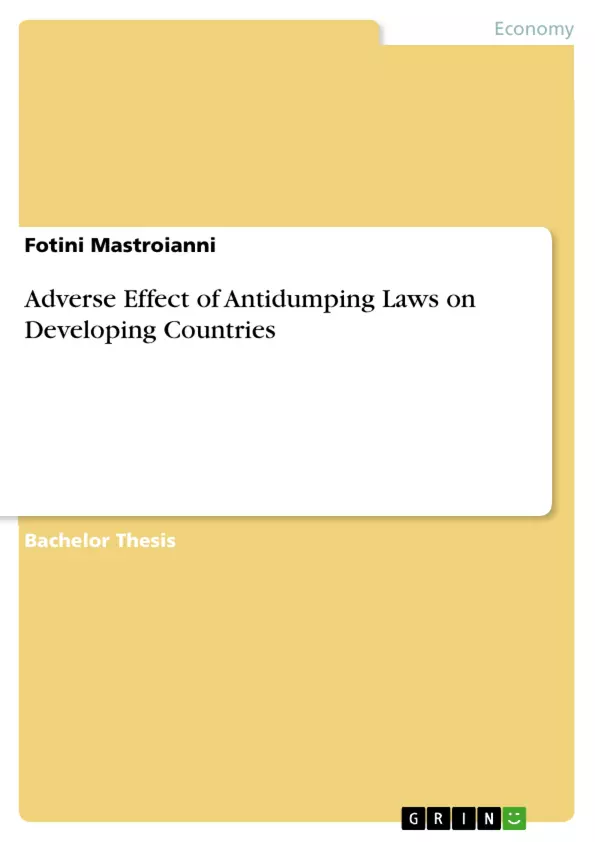An unfair trade practice, dumping, occurs when a company sells its products abroad at prices lower than the price of the market in which they are produced, or even below cost. This mainly happens because export firms may have an excess capacity, and want to have a larger market share in a foreign country against domestic products. This practice is internationally considered as a practice of unfair competition. Therefore, anti-dumping measures are imposed. The anti-dumping duty is independent of import duties and functions additionally to the common tariff practices.
Many times, however, it may be the case that anti-dumping measures are imposed on certain products without having them previously dumped. This is more than dangerous. The unfair imposition of anti-dumping measures aims to strengthen the local industry against imported goods, which worsens protectionism worldwide .
Recently, the U.S. and China were engaged in announcements of additional mutual anti-dumping measures. Within a very short time, the U.S. imposed high temporary tariffs on Chinese aluminium products and steel as well as some types of paper. China responded by imposing tough antidumping tariffs on U.S. imports of chicken and nylon in retaliation. In general, the confirmation of the existence of this illegal practice is extremely difficult and requires extensive timely research. Furthermore, it should also be investigated whether the particular industry has been harmed.
In the present study, the framework of international trade and the various measures such as tariffs and quotas will be presented to understand better the international economic environment. Dumping and antidumping measures will be examined both on the financial side but also on the legal side. Finally, the effect of antidumping measures to developing countries will be further studied.
Inhaltsverzeichnis (Table of Contents)
- Introduction
- International trade
- Global economic competition and the liberalization trend of international trade.
- The unstable economic hegemony of the U.S.
- Trade Barriers
- Tariffs
- Tariff on a single commodity with a stable global price..
- Non-Tariff Barriers
- Export Subsidies - Premiums
- Restrictions On Imports - Exports // Import Quotas....
- Voluntary Export Restraints - VER.
- Local Content Requirements.
- Unofficial Barriers.......
- Administrative Policies
- Embargoes...
- International Cartels
- Dumping Policies
- Adoption of Antidumping Measures.
- Antidumping measures..
- Dumping – Legal Framework.
- Existing Law
- International Framework.
- European Community Legislation
- Dumping and countervailable subsidies..
- Dumping and Subsidies..
- Interest of the Community.
- Material injury and causal link.
- Legal framework
- Changes to EU legislation in 2001.
- Conclusion on measures.
- Reasons for using measures of economic trade policy
- Political Reasons Jobs & Business....
- Support of Economic & Foreign Policy.
- Consumer Protection..
- Protection of Human Rights.
- Economic Reasons
- State Revenues
- Infant Industry
- Shortcomings of GATT.
- Reform of the Anti-Dumping Code
- Conclusions on the Uruguay Round.
- Development and Developing Countries..
- The Agreement On Technical Barriers To Trade Goods – Environmental Dumping
- Developing Countries and Protectionism..
- Recent Development – Tariffs and AntiDumping
- The theory of Customs Union - Trade Diversion.
- Trade effects of antidumping protection.
- "South-South” trade – antidumping
- Conclusion......
- Tariffs
Zielsetzung und Themenschwerpunkte (Objectives and Key Themes)
This study delves into the practice of dumping, specifically examining its impact on developing countries. It aims to analyze the use of antidumping measures as a response to dumping, exploring both the financial and legal implications. The research investigates the potential harm these measures can cause, particularly in the context of international trade and globalization.
- The global economic environment and the liberalization trend of international trade.
- Dumping as an unfair trade practice and its impact on developing countries.
- Antidumping measures as a response to dumping, examining their economic and legal aspects.
- The role of antidumping measures in international trade relations, including the influence of economic crises.
- The effect of antidumping measures on "South-South" trade and their potential consequences for developing nations.
Zusammenfassung der Kapitel (Chapter Summaries)
The initial chapter introduces the concept of dumping and its impact on international trade. It further explores the implications of antidumping measures, including their effectiveness and potential drawbacks.
Chapter 4 delves into the intricate world of international trade, exploring its benefits, challenges, and underlying political and economic factors. It examines the historical context of trade policy and the factors that contribute to its complexity.
Schlüsselwörter (Keywords)
This study focuses on key concepts such as international trade, dumping, antidumping measures, developing countries, trade liberalization, protectionism, and "South-South" trade. It further explores themes related to global economic competition, economic hegemony, trade barriers, and the impact of economic crises on trade practices.
Frequently Asked Questions
What is the definition of 'dumping' in international trade?
Dumping occurs when a company sells products abroad at prices lower than in their home market, or even below production costs, to gain market share.
Why are antidumping measures sometimes considered dangerous?
They can be unfairly imposed to strengthen local industries against imports, which promotes global protectionism rather than fair competition.
How do antidumping laws affect developing countries?
The study highlights that these measures can have adverse effects, worsening the economic environment for developing nations and hindering 'South-South' trade.
What is the legal framework for antidumping in the EU?
The paper discusses European Community legislation, specifically looking at material injury, causal links, and changes made to EU laws in 2001.
What recent trade conflict is used as an example in the study?
The study mentions the mutual imposition of tariffs and antidumping measures between the U.S. and China involving steel, aluminum, and agricultural products.
- Quote paper
- Fotini Mastroianni (Author), 2010, Adverse Effect of Antidumping Laws on Developing Countries, Munich, GRIN Verlag, https://www.grin.com/document/346957



